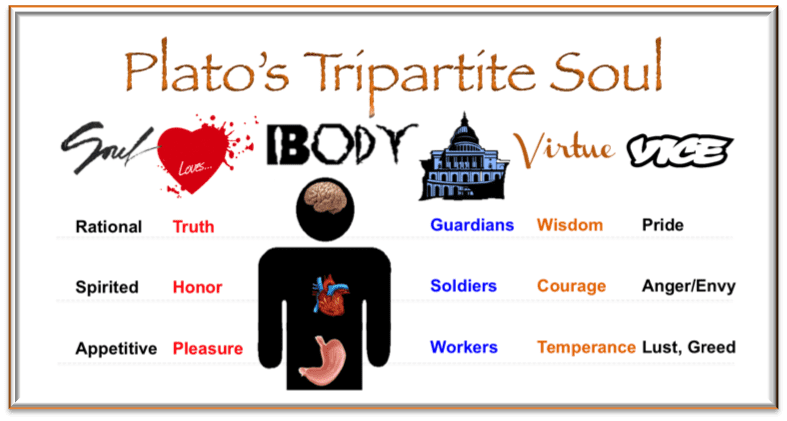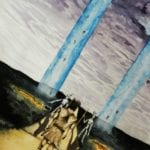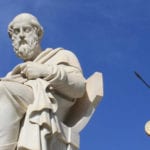Plato’s Republic (Book VIII)

Review of the Aristocracy
(543)Socrates picks up the argument that was interrupted in Book V. Glaucon remembers that Socrates was about to describe the four types of unjust regime along with their corresponding unjust individuals (543c-544b).
- kings excell in war and philosophy
- women and children are held in common
- education held in icommon in nwar and peace
- rulers have no privacy and special dwellings
- rulers have no possessions but lve year to year with neccessities and look after state affairs and their own.
Socrates announces that he will begin discussing the regimes and individual that deviate the least from the just city and individual and proceed to discuss the ones that deviate the most (545b-c). The cause of change in regime is lack of unity in the rulers (545d). Socrates indicates that it would eventually change since everything which comes into being must decay (546a-b). The more you spread the power, the more the diversity of natural ability there will be in the govt and an ability.
Timocracy (543a-550c) love of victory and of honor, not virtue.
Reason for transition: The rulers are bound to make mistakes in assigning people jobs suited to their natural capacities and each of the classes will begin to be mixed with people who are not naturally suited for the tasks relevant to each class (546e). This will lead to class conflicts (547a).
- The rulers don’t follow the geometry, and breed irregularly and so their sons are not as good as they were.
- Division arises between those who are interested in making money and having possessions and those interested in philosophy and virtue.
- As a compromise, the best agree to reintroduce private property, people will be enslaved, and war will consume all their energy.
Mark of Timocracy: Emphasizes the pursuit of honor rather than wisdom and justice (547d ff.).
- They will divide the duties of the city into separate roles (farming vs. military) and will engage in their meals and their athletic training all in common spaces.
- The timocracy won’t put the wisest guys in charge of the city; they’ll put the ones who are totally into war and conflict in charge.
- These rulers will also be into money and will try to do anything to acquire and save their own moolah while happily spending their friends’ money on bad things.
- Why are these rulers like this? Because their education was forced on them and because athletics was way more emphasized than music or philosophy.
The Timocratic soul: he listens to his mother complain about his father’s lack of interest in honor and success (549d). The timocratic individual’s soul is at a middle point between reason and spirit. The timocratic individual will have a strong spirited part in his soul and will pursue honor, power, and success (549a).
- Because this man would not have been properly trained in both music and argumentation, he wouldn’t be as devoted to virtue as he should be.
- child of an idealistic father and a nagging mother. Because the father hated all the gossip and pettiness of political life, he would have left that world and tried to mind his own business.
Oligarchy (550c-557a)
Reason for Transition:
- Too many debts to pay off and they pervert the law to deal with this, since they already ignore it anyways.
- people will pursue wealth and envious and confuse money with virtue;
- they honor the wealthy instead and set up this constitution by intimidation.
Mark of Oligarchy: emphasizes wealth rather than honor (550c-e)
- Problem is that you don’t give a captain his job just because he has money. So you shouldn’t honor or let someone rule just because he has money.
- it will essentially be two cities, a city of wealthy citizens and a city of poor people;
- the few wealthy will fear the many poor; people will do various jobs simultaneously;
- the city will allow for poor people without means; it will have a high crime rate.
- This creates more and more beggars who lack education and more people using money to appear like they are ruling worthy.
Oligarchic Soul: The oligarchic individual comes by seeing his father lose his possessions and feeling insecure he begins to greedily pursue wealth (553a-c)
- He leaves courage and ambition behind for making money because of seeing this disaster makes him fear losing money and food and he will certainly end up successful.
- Only rational concern he has is making more money out of less money.
- Education is disgarded because wants to avenge the poor who are wrongly treated.
- The oligarch still restrains his desire for wealth but guardians start mistreating orphans.
Democracy (557a-565d)
Reason for Transition:
- the rich become too rich and kids become spoiled and the poor too poor (555c-d)
- The poor plot against the rich craving revolution.
- Rulers are unwilling to discipline, and allow evils to proliferate
- The money makers continue to inject the poison of money into their children and they become soft and licentious and the poor revolt against them (556c-e). The poor realize that the rich are weaklings.
Mark of Democracy
- There is no compulsion to be a ruler in this state.
- In democracy most of the political offices are distributed by lot (557a).
- The convicted roam free
- Tolerance and disregard for detail and contempt for virtue,
- One is honored for being a “people’s supporter”
- The primary goal of the democratic regime is freedom or license (557b-c).
- People will come to hold offices without having the necessary knowledge (557e) and everyone is treated as an equal in ability (equals and unequals alike, 558c).
- Democrats punish rulers if they aren’t easygoing enough, and accuses them of being mean nasty oligarchs.
- Respects publicly and privately those rulers who act like they are subjects rather than rulers. (anticlericalism).
- Fathers act like children and children disrespect athers
- Teachers crack jokes to not appear authoritarian.
- There is little respect for the law.
Democratic Soul: The democratic individual comes to pursue all sorts of bodily desires excessively (558d-559d) and allows his appetitive part to rule his soul.
- The democrats are ruled by inessentials while the oligarchs were ruled by the essentials.
- He comes about when his bad education allows him to transition from desiring money to desiring bodily and material goods (559d-e).
- The democratic individual has no shame and no self-discipline (560d).
Tyranny
Transition to Tyranny comes next….
Transition to Tyranny:
- Tyranny arises out of democracy when the desire for freedom to do what one wants becomes extreme (562b-c). Each constitution has mistakenly defined something as good.
- The freedom or license aimed at in the democracy becomes so extreme that any limitations on anyone’s freedom seem unfair.
- Socrates points out that when freedom is taken to such an extreme it produces its opposite, slavery (563e-564a).
- Democrats punish rulers if they aren’t easygoing enough, and accuses them of being mean nasty oligarchs.
- Respects publicly and privately those rulers who act like they are subjects rather than rulers. (anticlericalism).
- Fathers act like children and children disrespect others
- Teachers crack jokes to not appear authoritarian.
- There is little respect for the law.
- There forms three groups from lazier prodigal men:
- They sit on committees and don’t get anything done or tolerate any other opinions if they ask for restraint or conservation
- The naturally best become ht erichest and are the feeding groud of pleasures for the rest who becomes drones: lazy suckers on the tit of the gov’t.
- Ordinary people – they are the most powerful when they are united, but don’t unite unless they get their honey. Sometimes they are forced to speak in the assembly to defend their rights where they are accuse of being oligarchs.
- The rich people are accused of being seditionists and oligarchs and defend themselves court.
- They are willingly and unwillingly mislead
- They become oligarchs whether or not they want to be.
Mark of Tyranny/The Tyrant:
- The tyrant comes about by presenting himself as a champion of the these small people against the class of the few people who are wealthy (565d-566a).
- Tyrant initially is pleasing to everyone but is forced to commit a number of acts to gain and retain power:
- accuse people falsely,
- attack his kinsmen,
- bring people to trial under false pretenses,
- kill many people,
- exile many people,
- and purport to cancel the debts of the poor to gain their support (565e-566a).
- The tyrant eliminates the rich, brave, and wise people in the city since he perceives them as threats to his power (567c). Socrates indicates that the tyrant faces the dilemma to either live with worthless people or with good people who may eventually depose him and chooses to live with worthless people (567d).
- The tyrant ends up using mercenaries as his guards since he cannot trust any of the citizens (567d-e).
- The tyrant also needs a very large army and will spend the city’s money (568d-e), and will not hesitate to kill members of his own family if they resist his ways (569b-c).




